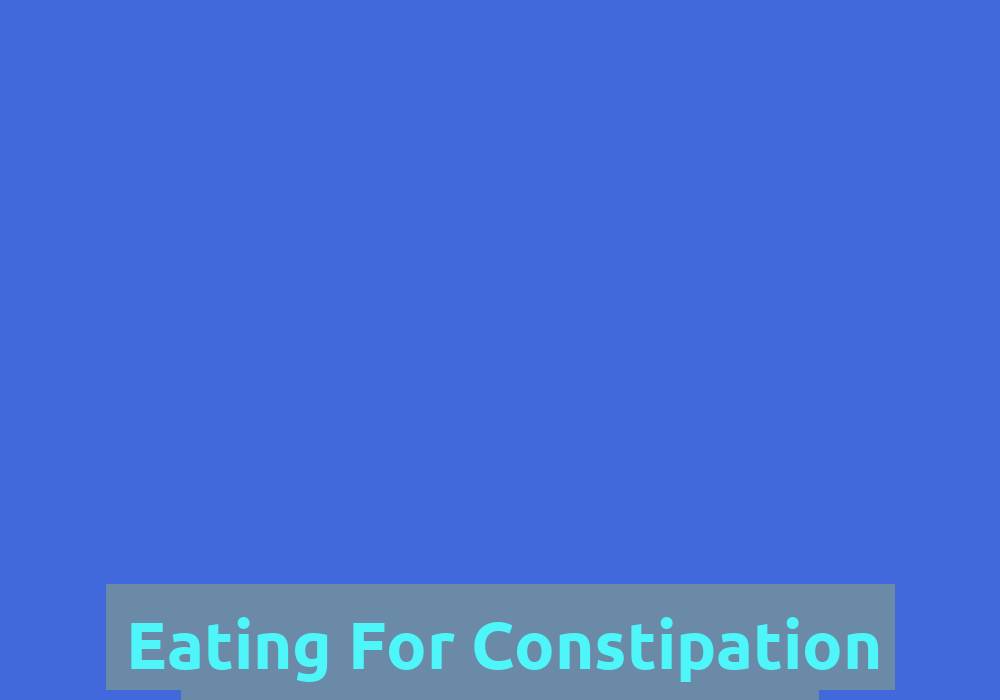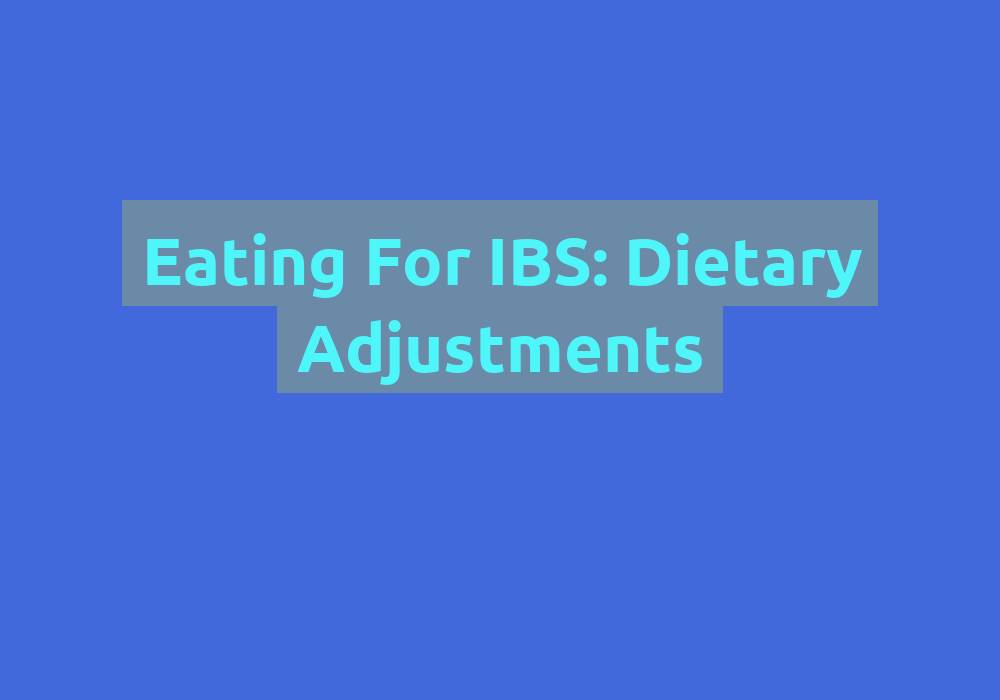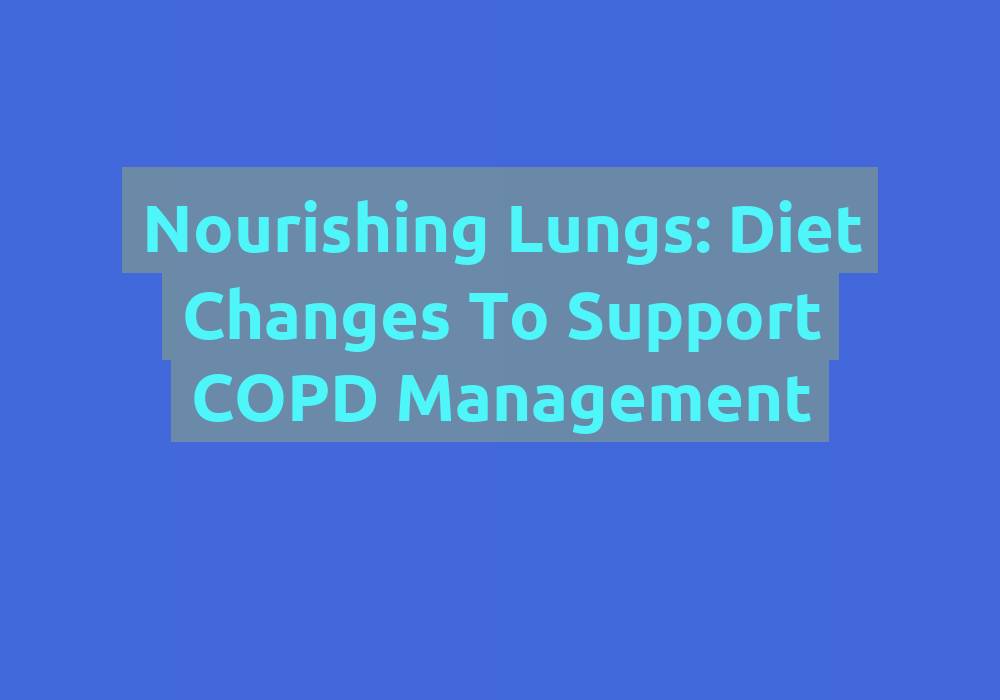Eating for Constipation Ease: Diet Changes

Constipation is a frustrating and uncomfortable condition that affects many people. It occurs when bowel movements become difficult or infrequent, causing discomfort and bloating. While there are various factors that can contribute to constipation, one of the most common and effective ways to alleviate it is through dietary changes. By making a few adjustments to your eating habits, you can promote regular bowel movements and improve your overall digestive health. In this article, we will explore some dietary tips and changes that can help ease constipation.
Increase Your Fiber Intake
Fiber is an essential nutrient that plays a crucial role in maintaining healthy digestion. It adds bulk to the stool, making it easier to pass through the intestines. By increasing your fiber intake, you can prevent and relieve constipation. Here are some excellent sources of dietary fiber:
-
Fruits and Vegetables: Incorporate a variety of fruits and vegetables into your diet, as they are rich in fiber. Apples, bananas, berries, oranges, broccoli, spinach, and carrots are just a few examples of fiber-packed options. These fruits and vegetables not only provide fiber but also contain essential vitamins, minerals, and antioxidants that support overall digestive health.
-
Whole Grains: Opt for whole grain products such as whole wheat bread, brown rice, oats, and quinoa. These provide more fiber than refined grains, which have had the bran and germ removed. Whole grains also offer a range of nutrients, including B vitamins and antioxidants, that are beneficial for digestion.
-
Legumes: Beans, lentils, chickpeas, and other legumes are not only high in fiber but also contain beneficial nutrients. Try adding them to soups, salads, or as a side dish to increase your fiber intake. Legumes are also a good source of protein, which is important for overall health and muscle function.
-
Nuts and Seeds: Almonds, chia seeds, flaxseeds, and sunflower seeds are excellent sources of fiber. Sprinkle them onto salads, yogurt, or incorporate them into baking recipes. Nuts and seeds also provide healthy fats, vitamins, and minerals that support digestive health.
Increasing your fiber intake gradually is important to prevent any digestive discomfort. It is recommended to aim for about 25-30 grams of fiber per day for adults. Remember to drink plenty of water along with your fiber-rich foods to help the fiber move smoothly through your digestive system.
Stay Hydrated
Drinking an adequate amount of water is essential for maintaining healthy digestion and preventing constipation. Water helps soften the stool, making it easier to pass. Aim to drink at least eight glasses of water per day, and more if you engage in physical activities or live in a hot climate. Additionally, you can include other hydrating fluids such as herbal teas, clear broths, and fresh fruit juices.
Avoid Dehydrating Beverages
Certain beverages have dehydrating effects on the body, which can exacerbate constipation. Limit or avoid the consumption of drinks such as alcohol, caffeinated beverages like coffee and tea, and sugary sodas. These can contribute to dehydration and make your stools harder and more difficult to pass. Opt for hydrating alternatives like herbal teas, infused water, or natural fruit juices without added sugars.
Include Probiotics in Your Diet
Probiotics are beneficial bacteria that promote a healthy gut environment. They can help regulate bowel movements and alleviate constipation. Incorporating probiotic-rich foods into your diet can be highly beneficial. Some examples of probiotic-rich foods include yogurt, kefir, sauerkraut, kimchi, and kombucha. These foods contain live cultures of good bacteria that can improve digestion and promote regularity. Alternatively, you may consider taking a probiotic supplement after consulting with a healthcare professional.
Don’t Forget Healthy Fats
Including healthy fats in your diet can also contribute to regular bowel movements. These fats help lubricate the intestines, making it easier for stool to pass through. Good sources of healthy fats include avocados, olive oil, nuts, and fatty fish like salmon or mackerel. Aim to incorporate these fats into your meals in moderation for optimal digestive health. Additionally, these foods provide essential nutrients such as omega-3 fatty acids, which have anti-inflammatory properties and support overall well-being.
Consider Magnesium-Rich Foods
Magnesium is a mineral that can help relieve constipation by relaxing the muscles in the intestinal walls. Including magnesium-rich foods in your diet can be helpful, but remember to consult with a healthcare professional before making any significant dietary changes. Foods that are high in magnesium include green leafy vegetables like spinach and kale, almonds, pumpkin seeds, and whole grains. These foods not only provide magnesium but also offer other nutrients like vitamins, minerals, and antioxidants that contribute to digestive health.
Stay Active and Exercise Regularly
Regular physical activity and exercise can stimulate bowel movements and promote healthy digestion. Engaging in activities such as walking, jogging, swimming, or cycling can help alleviate constipation. Exercise helps to stimulate the muscles in the intestines, aiding in the movement of waste through the digestive system. Aim for at least 30 minutes of moderate-intensity exercise most days of the week. Remember to start slowly if you are new to exercise and gradually increase the intensity and duration over time.
Conclusion
Constipation can be a bothersome condition, but making simple dietary adjustments can make a significant difference in promoting regular bowel movements. Increasing fiber intake, staying hydrated, incorporating probiotics, and including healthy fats and magnesium-rich foods can help alleviate constipation. Additionally, staying active and exercising regularly can also contribute to healthy digestion. Remember to consult with a healthcare professional before making any drastic dietary changes, especially if you have any existing health conditions. With these dietary tips, you can take control of your digestive health and find relief from constipation.
The complete article is shown below in markdown format:
# Eating for Constipation Ease: Diet Changes
Constipation is a frustrating and uncomfortable condition that affects many people. It occurs when bowel movements become difficult or infrequent, causing discomfort and bloating. While there are various factors that can contribute to constipation, one of the most common and effective ways to alleviate it is through dietary changes. By making a few adjustments to your eating habits, you can promote regular bowel movements and improve your overall digestive health. In this article, we will explore some dietary tips and changes that can help ease constipation.
Increase Your Fiber Intake
Fiber is an essential nutrient that plays a crucial role in maintaining healthy digestion. It adds bulk to the stool, making it easier to pass through the intestines. By increasing your fiber intake, you can prevent and relieve constipation. Here are some excellent sources of dietary fiber:
- Fruits and Vegetables: Incorporate a variety of fruits and vegetables into your diet, as they are rich in fiber. Apples, bananas, berries, oranges, broccoli, spinach, and carrots are just a few examples of fiber-packed options.
- Whole Grains: Opt for whole grain products such as whole wheat bread, brown rice, oats, and quinoa. These provide more fiber than refined grains, which have had the bran and germ removed.
- Legumes: Beans, lentils, chickpeas, and other legumes are not only high in fiber but also contain beneficial nutrients. Try adding them to soups, salads, or as a side dish to increase your fiber intake.
- Nuts and Seeds: Almonds, chia seeds, flaxseeds, and sunflower seeds are excellent sources of fiber. Sprinkle them onto salads, yogurt, or incorporate them into baking recipes.
Stay Hydrated
Drinking an adequate amount of water is essential for maintaining healthy digestion and preventing constipation. Water helps soften the stool, making it easier to pass. Aim to drink at least eight glasses of water per day, and more if you engage in physical activities or live in a hot climate. Additionally, you can include other hydrating fluids such as herbal teas, clear broths, and fresh fruit juices.
Avoid Dehydrating Beverages
Certain beverages have dehydrating effects on the body, which can exacerbate constipation. Limit or avoid the consumption of drinks such as alcohol, caffeinated beverages like coffee and tea, and sugary sodas. These can contribute to dehydration and make your stools harder and more difficult to pass.
Include Probiotics in Your Diet
Probiotics are beneficial bacteria that promote a healthy gut environment. They can help regulate bowel movements and alleviate constipation. Incorporating probiotic-rich foods into your diet can be highly beneficial. Some examples of probiotic-rich foods include yogurt, kefir, sauerkraut, kimchi, and kombucha. Alternatively, you may consider taking a probiotic supplement after consulting with a healthcare professional.
Don't Forget Healthy Fats
Including healthy fats in your diet can also contribute to regular bowel movements. These fats help lubricate the intestines, making it easier for stool to pass through. Good sources of healthy fats include avocados, olive oil, nuts, and fatty fish like salmon or mackerel. Aim to incorporate these fats into your meals in moderation for optimal digestive health.
Consider Magnesium-Rich Foods
Magnesium is a mineral that can help relieve constipation by relaxing the muscles in the intestinal walls. Including magnesium-rich foods in your diet can be helpful, but remember to consult with a healthcare professional before making any significant dietary changes. Foods that are high in magnesium include green leafy vegetables like spinach and kale, almonds, pumpkin seeds, and whole grains.
Stay Active and Exercise Regularly
Regular physical activity and exercise can stimulate bowel movements and promote healthy digestion. Engaging in activities such as walking, jogging, swimming, or cycling can help alleviate constipation. Aim for at least 30 minutes of moderate-intensity exercise most days of the week.
Conclusion
Constipation can be a bothersome condition, but making simple dietary adjustments can make a significant difference in promoting regular bowel movements. Increasing fiber intake, staying hydrated, incorporating probiotics, and including healthy fats and magnesium-rich foods can help alleviate constipation. Additionally, staying active and exercising regularly can also contribute to healthy digestion. Remember to consult with a healthcare professional before making any drastic dietary changes, especially if you have any existing health conditions. With these dietary tips, you can take control of your digestive health and find relief from constipation.
FAQ
Q: What is constipation?
A: Constipation is a condition where bowel movements become difficult or infrequent, causing discomfort and bloating.
Q: How can dietary changes help alleviate constipation?
A: By making adjustments to your eating habits, such as increasing fiber intake and staying hydrated, you can promote regular bowel movements and improve digestive health.
Q: What are some good sources of dietary fiber?
A: Fruits, vegetables, whole grains, legumes, nuts, and seeds are excellent sources of dietary fiber.
Q: How can probiotics help alleviate constipation?
A: Probiotics are beneficial bacteria that promote a healthy gut environment, regulate bowel movements, and alleviate constipation. They can be found in foods such as yogurt, sauerkraut, and kombucha.


